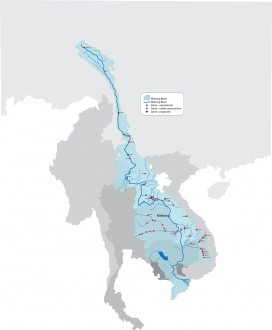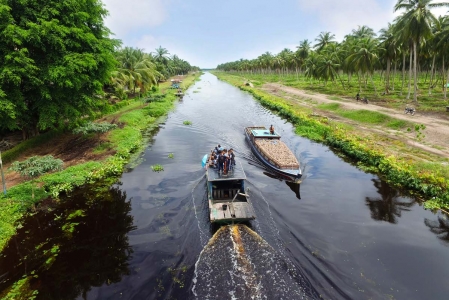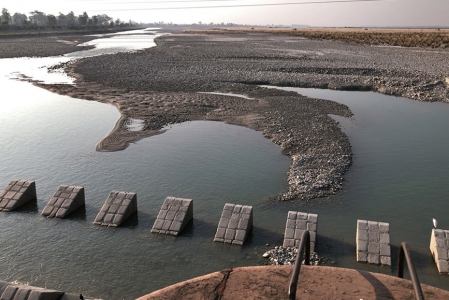A review of “Scalar disconnect: The logic of transboundary water governance in the Mekong” by Diana Suhardiman, Mark Giordano, and Francois Molle in Society and Natural Resources Vol 25 (6): 572-586. Taylor & Francis generously granted free access to the article for 30 days from October 11 2012.
I read "Scalar Disconnect" with a distinct sense of déjà vu. Between 2000 and 2003, I worked almost exclusively for the Mekong River Commission (MRC) Secretariat, then in Phnom Phenh. I worked for every department in the Secretariat, all four National Mekong Committees and scores of line agencies and civil society ‘partners’. I like to think I had, at one point in time, a unique “birds-eye” view of the MRC.
Having seen the organization close up in all its facets, I came to the conclusion that the MRC works exactly the way everyone wants it to work. In the words of D’Arcy Wentworth Thompson, “Everything is what it is because it got that way”. Scalar Disconnect explains, more articulately than I ever have, how it is and how it got that way.
Institutional Analysis
Scalar Disconnect offers an “institutional analysis” of the MRC and examines the disconnect between regional and national scales of decision making. The authors argue that member country representatives and international donor agencies purposely obscure tensions and potential conflict situations and question academic approaches that depict the State as the main actor in international relations.
The article begins with international donors and how their support is often based on widely varying concepts of integrated water resources management, how they tend to overlook or simplify political processes and power dynamics, and how they reduce decision making to technical and managerial issues.
The initial declaration of the argument is that the Mekong River Commission “has been unable to translate the outcomes of its regional programs into policy formulation at the national level.” The reasons are the familiar villains of sectoral fragmentation within national bureaucracies and the mismatch between the aims and goals of a transboundary entity that reflects to a very large extent the interests of the international donor community and realpolitik national interests.
The institutional history part of the article is refreshingly blunt. The authors make no concessions to political correctness and do not attempt to sugarcoat or obscure the realities normally verbalized in the relatively safe confines of coffee break and after-hours debates. For example:
A country would in most cases approve MRC's program activities as long as these activities do not threaten national development interests. In the opposite case, the country would then use the national consultation meeting as its means to halt the effort.
And later…
Lacking the power with regard to individual ministries, the Joint Committee and the Council hardly function as an interministerial decision making platform, despite the fact that (sector) ministries are formally represented within both the Joint Committee and the Council.
Conspiracy of silence
I can think of readers who will consider these and similar statements a gross breach of etiquette if not an outright betrayal of trust. The authors suggest that this very conspiracy of silence is what allows the “MRC and country members [to] proceed with conflicting developmental plans and reproduce the current disconnect between the national and regional level decision making landscape without displaying this tension in public.” Too bad they have blown the whistle.
As a long-time participant observer in the workings of the MRC and its Secretariat, I find the institutional analysis rings true. I question the proposition that it “brings into light MRC’s isolation” and that it “cannot be blamed for failure to achieve more than what these countries want”. If the MRC is ‘isolated’ it is isolated the way a fulcrum is isolated from a lever. As for “failure to achieve”, The authors admit that the MRC is, “a place of confrontation where members are sometimes forced to conceal or halt plans. It brings in grand discourses and concepts that can also legitimate some knowledge production that members would not like to see.” That capacity to bring in the grand discourses and legitimate knowledge is no small achievement and may be exactly what the countries want.
In my reading of the paper, its weakness lies in not going much beyond the institutional history (which is excellent) and persisting in the implicit conceit that international donors have a right to meddle in the affairs of sovereign states (“We should expand the current discourse on the MRC’s role from international to national fora.”). I have always been of the opinion that the best way to “increase the ownership of the MRC” is for the international community to get out the way (a la Dambisa Moyo) and let the countries get on with it. I suspect that if the MRC didn’t exist the countries would have to invent it because it is just too good an idea not to.
Scanning the list of references, the “going beyond” would not be difficult. The references make an intriguing reading list and I find myself wishing the authors had related their argument more explicitly to topics like the role of discourse, problem structuring, and the science-policy interface. For example, some reference to the literature on problem structuring would be useful (see for example Hisschemoller and Hoppe, 1995-96). Nonetheless, readers interested in the interaction between social and bio-physical processes and policies and practices at multiple scales will find Scalar Disconnect well worth the read.
Your turn
Read the article, which Taylor & Francis has granted free access to for the following 30 days.
See Diana Suhardiman's presentation "Between interests and worldviews: The narrow path of the Mekong River Commission" from the Global Water Systems Project: Water in the Anthropocene Conference, 21-24th May 2013.
Contact the authors
Diana Suhardiman suhardiman@gmail.com
Mark Giordano mark.giordano@cgiar.org
François Molle f.molle@cgiar.org
Learn more about this topic (Selected references from the paper)
Bakker, K. 1999. The politics of hydropower: Developing the Mekong. Political Geography 18:209-232.
Dellapenna, J. 1994. Treaties as instruments for managing internationally-shared water resources: Restricted sovereignty vs. community of property. Case Western Reserve Journal of International Law 26: 25-56.
Miller, F., and P. Hirsch. 2003. Civil society and internationalized river basin management. Working Paper No. 7. Sidney, Australia: Australian Mekong Resource Centre, University of Sidney.
Molle, F., and P. Floch. 2008. The “Desert bloom” syndrome: Irrigation development, politics, and ideology in the Northeast of Thailand. Working paper #. Chiang Mai, Thailand: Mekong Program on Water, Environment and Resilience.
Shah, T., I. Makin, and R. Sakthivadivel. 2001. Limits to leapfrogging: Issues in transposing successful river basin management institutions in the developing world. In: Intersectoral management of river basins: Proceedings of an international workshop on “Integrated Water Management in water-stressed river basins in developing countries: Strategies for poverty alleviation and agricultural growth, ed. C. Abernethy. Loskop Dam, South Africa, 16-21 October. Colombo, Sri Lanka: IWMI and German Foundation for International Development (DSE). Include page numbers of article
Strauss, A. and J. Corbin. 1990. Basics of qualitative research: Grounded theory procedures and techniques. New Delhi, India: Sage publications.
Yin, R. K. 1994. Case study research: Designs and methods. Applied social research methods Series no. 5. London: Thousand Oaks and Sage Publications.
Zeitoun, M. and J. Warner. 2006. Hydro-hegemony: A framework for analysis of transboundary water conflicts, Water Policy 8: 435-460.
Other references
Links
Challenge Programme on Water and Food (work in other river basins: Andes, Ganges, Limpopo, Volta, Mekong, Nile).
About the authors
DIANA SUHARDIMAN, Researcher-Social Scientist at IWMI
Diana Suhardiman is an irrigation engineer and social/policy scientist with experience in water resources management and water governance. Her current research focuses on multi-level policy and institutional analysis of water resources development in the Mekong. This includes the institutional analysis of the Mekong River Commission (MRC) and the overall mapping of sectoral decision-making frameworks in the four Lower Mekong Basin countries (Cambodia, Vietnam, Thailand, Lao PDR). Currently, Diana leads an initial review of national policy and legal framework on land-water-environment management focusing on hydropower and livelihoods options within the Mekong region.
MARK GIORDANO, Theme Leader - Water and Society, IWMI Headquarters - Sri Lanka
Mark Giordano is a geographer and economist with wide experience in agriculture, water and development. He is currently Principal Researcher and Director of Water and Society Research at the International Water Management Institute (IWMI), a member of the CGIAR Consortium. Prior to joining IWMI, Mark worked as an agricultural trade economist with the U.S. Department of Agriculture’s Economic Research Service. He also spent many years working on a large groundwater irrigated farm in the western U.S.
FRANCOIS MOLLE, Principle Researcher at IWMI
François Molle is a senior researcher at the Institut de Recherche pour le Développement, France, and holds a joint appointment with the International Water Management Institute (IWMI). He has 25 years experience in irrigation and water management in South America, Africa, Asia and the Middle-East region. François’s current research activities focus on institutional and political aspects of river basin development and management, irrigation water pricing, water governance and water policy; he is editor of the Water Alternatives (WaA) journal (www.water-alternatives.org).
Review by Terry Clayton















Comments
Excellent review of a very interesting paper. It is refreshing to see social scientists at an international research organizations write "blunt" analyses on such politically sensitive issues.
Isn't is just. Most 'analyses' are so wishy washy they mean nothing to anyone. How does anyone expect to have impact if they don't take a recognizable position on an issue.
... [Trackback]...
[...] There you will find 95168 more Infos: wle.cgiar.org/blogs/2012/10/11/everything-is-what-it-is-because-it-got-that-way/ [...]...
The following comment was emailed by Melvin Woodhouse, David Phillips and Mark Zeitoun in response to an FYI from David JH Blake. This comment was posted in a Yahoo discussion group TransboundarywaterDG:
The ‘Scalar Disconnect’ paper, together with the commentary via Terry Clayton’s blog are of very great interest to all concerned with developments on the Mekong, and more generally with hydropolitics elsewhere. In our experience analogous scenarios are emerging in the present generation of RBOs being supported with external aid, particularly those in Africa. Certainly there is important merit and urgency to exploring the accountability and roles of these RBOs.
We also note Susanne Schmeier’s work “Opening the black box of River Basin Organizations”
https://www.globalwaterforum.org/wp-content/uploads/2012/10/Opening-the-b...
In our view, three important sets of questions need to be answered, each of which are relevant to the Mekong in isolation but also to many other trans-boundary basins.,
Firstly, should there be enhanced accountability of RBOs that are supported through external aid? We are not aware of a level of monitoring of RBOs which would be in keeping with similar high levels (and long periods) of investment in other spheres. We are aware of basic financial and “project level intervention” audits – but what about accountability against the overall object and purpose of a trans-boundary organisation? Why do the donors not trigger broader-based reviews of financing outcomes, especially in basins that have received external support for several decades? Are the donors (and their interventions) part of the solution, or part of the problem?
Secondly, it is surely a concern when an RBO evolves into a role of [only] doing the same thing which national governments can and should be doing. Are RBOs actually achieving things which its riparian members are not able to achieve by acting independently? Why, then, should riparian tax payers and donors agencies finance duplication, and isn’t there a risk that this alternative “project” agenda removes the impetus to achieve the more important – if not more difficult – real trans-boundary objectives and purpose? Which RBOs can claim to truly address trans-boundary issues – such as [transboundary management, or peaceful relations, or shared economic development?] If some riparians fail to engage – as in the Mekong, for example – how robust is the process they are actually involved in? Where the RBOs fail to adequately address trans-boundary issues per se, does this reflect their limited power due to difficulties created by sovereignty concerns of the co-riparians? Doesn’t this imply that in some cases, RBOs are paper tigers at best, fig-leafs for uncoordinated ‘development’ in the interests of the powerful, at worst?
Thirdly, further comparative analysis of RBOs instigated by aid and those which were home-grown would be very illuminating. Suhardiman et al’s Scalar Disconnect manuscript portrays a difficult truth by considering the 55 year history of a single RBO – can we expect RBOs to evolve into a properly trans-boundary role, or must they have a properly trans-boundary role from the outset? This is a very loaded question, and speaks to the need for more tightly framed and audited donor financing, at least, and preferably transparency about objectives and activities.
We believe that improved scrutiny of RBOs is of importance: [a] as a means to enable national governments to fully realise and achieve what are domestic responsibilities; [b] as a means to properly manage the huge investments RBOs receive; and also [c] as a means to ensure that RBOs perform a useful function that can continue to justify their position.
That the academic community has had to lift the lid on RBO accountability is a credible achievement – that there is no adequate accountability in place is surely unacceptable. We therefore believe that in the absence of such accountability, the investigation and analysis of RBOs should be a matter for further research. However, it would be an enlightened donor that would favour supporting this work, and we would also encourage more independent work of the Scalar Disconnect variety.
Melvin Woodhouse
David Phillips
Mark Zeitoun
... [Trackback]...
[...] Read More here: wle.cgiar.org/blogs/2012/10/11/everything-is-what-it-is-because-it-got-that-way/ [...]...
... [Trackback]...
[...] Read More Infos here: wle.cgiar.org/blogs/2012/10/11/everything-is-what-it-is-because-it-got-that-way/ [...]...